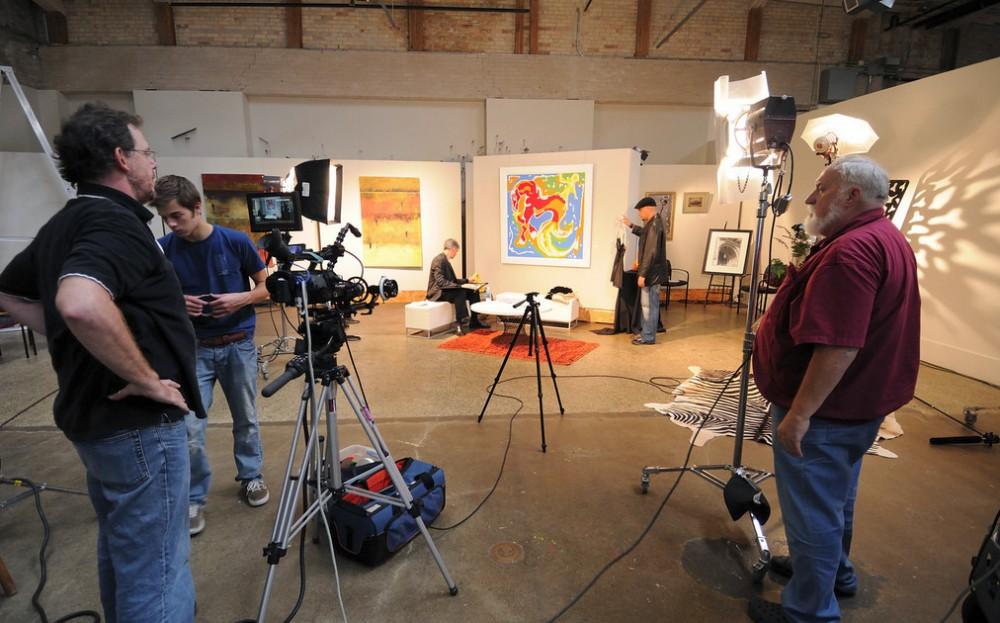GV to help host second-annual Michigan Film Festival

Courtesy Photo / irvingimages.com Grand Valley State University film instructor Harper Philbin oversees the set up of a film worshop during last years Michigan Film Festival
Nov 11, 2010
The second-annual Michigan Film Festival begins Friday with its new partner Grand Valley State University.
The festival runs all weekend and features discussions, screenings and workshops of Michigan films and studies of their production. Films will play at the Urban Institute for Contemporary Art, the Grand Rapids Art Musuem and GVSU’s Loosemoore Auditorium.
Films include notable Michigan entries in film festivals from around the state and quality student entries. From fat-pocket productions featuring Hollywood stars such-as Adrien Brody to mom-and-pop financed independent films, the slate is full of Michigan’s film variety.
But with the shift in political power in Lansing, the future of the Michigan Film Festival and the entire film industry in Michigan remains uncertain.
The Snyder camp does not agree with Granholm’s support of the Michigan film tax incentives that have brought record film activity to the state and an influx of taxable out-of-state dollars.
In an article published in May, Grand Rapids Press writer David Veselenak covered a town hall meeting in Grand Rapids during which Snyder spoke about the state’s 42 percent tax credit for filming in Michigan. He said the tax credit was one more thing that needs to be eliminated.
“It simply can’t work at that level,” he said. “The government is not qualified to pick winners and losers. That’s a case of the government being short-sighted.”
Snyder was unavailable for further comment at time of print.
To Jen Pider, co-founder of the Michigan Film Festival, Snyder’s plans to consolidate and merge governmental units do not bode well for the film industry,
“We’ve all known that there is probably a shelf life to the incentives, but there is some red tape still, and they won’t go away overnight,” Pider said. “There is still a bureaucracy to get through.”
GVSU film professor John Philbin, who will direct the workshop portion of the weekend’s festivities, is more concerned for his students’ futures.
“In the last 10 years that I’ve been here, the industry has all changed,” he said. “There are more support services, more trained actors and the communities have been very open and supportive to filming. That doesn’t happen in a lot of places.”
Philbin said in the past when people pursued a career in film, they went to either Los Angeles or New York to hustle their way with the big shots. But since the incentives passed, students have e-mailed him to say they have found work on number of productions in state.
“This kind of thing would have never happened before the incentives,” he said. “I don’t know when its going to go or if it will, but the state of it is more up in the air than when Granholm was in office.”
While incentives await the verdict from new leadership, the festival has incorporated a preemptive strike on the speculated reforms due in state taxes.
A panel on Sunday will discuss putting the workforce back together and focus on ways the film industry in Michigan can help keep the new life-blood flowing.
Philbin said it is important to realize the incentives are not gone yet, but organizing to petition the new government and being prepared for their elimination are the next steps.
Nevertheless, opposition to the new state government is not the only motivation for showcasing the creative manifestations of a sundry state.
“We do have a African American Muslim population,” Pider said. “We are in the Bible belt here in West Michigan, and we did legalize marijuana for medical purposes. There are a lot of diverse issues in Michigan and these films kind of showcase that.”
Pider said while the government may not continue its pledge to arts, the community in West Michigan has been responsible for a great deal of the support in this year’s festival.
Operating on roughly the same $5,000 budget as last year, the event remains completely free of charge, save for the cash bar. Pider and other organizers secured Michigan beers and wines from Kent Beverage Company, and local watering hole The Winchester offered its catering services.
“The community pulled together this for this event,” Pider said. “If everyone continues to donate everything, we don’t need any money to do it.”






















